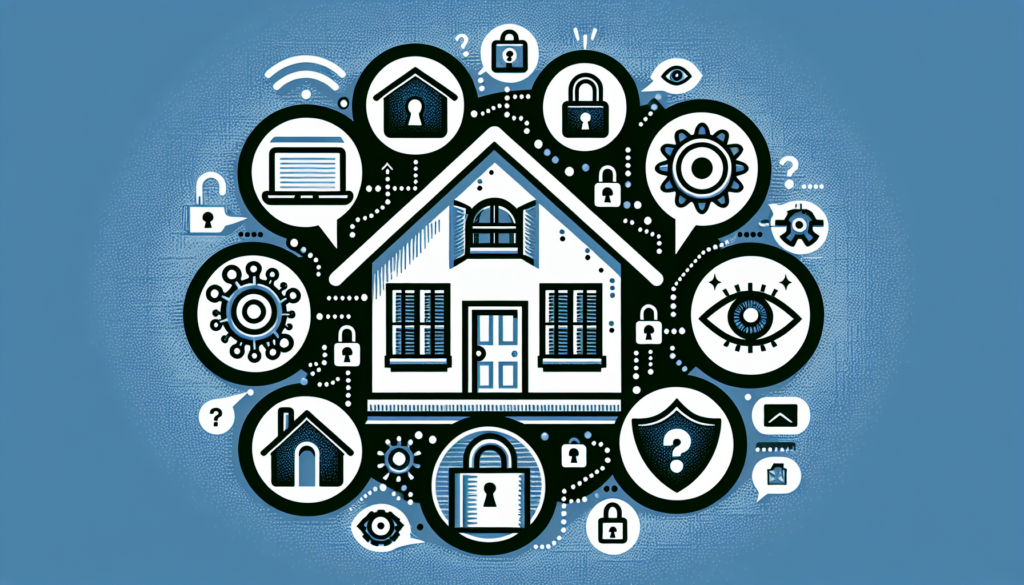In today’s digital age, chatbots have become an integral part of many industries, including home service businesses. However, their rapid integration raises important ethical questions that cannot be ignored. This article explores the various ethical considerations surrounding the use of chatbots in the realm of home service businesses, shedding light on the potential benefits and drawbacks of this technology. By examining the impact on customer privacy, trust, and human interaction, we hope to provide a comprehensive understanding of the ethical implications at play. So, fasten your seatbelts as we embark on a journey through the fascinating world of chatbots in home service businesses.

Understanding Chatbots in Home Service Businesses
Chatbots are computer programs designed to simulate conversations with human users, particularly through text or voice-based interactions. They are becoming increasingly prevalent in various industries, including home service businesses. These intelligent agents are programmed to understand and respond to customer inquiries, provide information, and assist with tasks, without the need for direct human intervention. By leveraging artificial intelligence (AI) and natural language processing (NLP) technologies, chatbots have the potential to revolutionize service delivery in the home service sector.
Current Utilization of Chatbots in Home Service Businesses
In recent years, chatbots have gained traction in the home service industry. They have been widely adopted by companies in sectors such as home repairs, HVAC services, pest control, and home cleaning. Chatbots are commonly used to answer frequently asked questions, provide quotes and estimates, schedule appointments, and even troubleshoot common issues. By automating these routine tasks, businesses can streamline their operations, improve efficiency, and enhance customer experiences.
Potential of Chatbots in Improving Service Delivery
The integration of chatbots into home service businesses holds great potential for improving service delivery. By utilizing machine learning algorithms, these chatbots can learn from user interactions and continuously improve their responses and recommendations. This enables them to provide personalized and accurate information, resulting in faster problem resolution and increased customer satisfaction. Moreover, chatbots can operate 24/7, offering round-the-clock support to customers, thereby eliminating the need to rely solely on human agents and reducing response times.
Privacy Concerns in Using Chatbots
While chatbots offer numerous benefits, their usage also raises privacy concerns. One of the primary sources of these concerns relates to the collection of personal information by chatbots. As these intelligent agents interact with users, they often collect and store data, including names, contact details, and even payment information. It is essential for businesses to ensure that they handle personal information responsibly and in accordance with privacy regulations.
Collecting Personal Information
Chatbots must be transparent about the types of information they collect and the reasons for doing so. Businesses must clearly communicate the purpose and necessity of collecting personal information to users. Moreover, they should only collect data that is relevant to providing the requested service and should avoid collecting excessive or unnecessary information. By keeping data collection limited and purposeful, businesses can address privacy concerns.
Storage and Use of Collected Data
Once personal information is collected, it is crucial for businesses to store and use the data securely and responsibly. Adequate measures, such as encryption and secure servers, should be implemented to safeguard the data from unauthorized access or breaches. Additionally, businesses should ensure that the collected data is used solely for the purpose agreed upon with the user and not shared or sold to third parties without explicit consent.
Risks of Data Breach and Misuse
The improper storage or misuse of collected data can lead to significant risks, such as data breaches and identity theft. Businesses must prioritize data security and employ robust cybersecurity practices to minimize these risks. Regular security audits and vulnerability assessments can help identify and address potential vulnerabilities in chatbot systems. By proactively managing security risks, businesses can protect both their customers’ data and their own reputation.
AI and Privacy Legislation
As AI technologies continue to advance, privacy legislation is evolving to address the ethical implications. Businesses utilizing chatbots must ensure compliance with applicable privacy laws and regulations. They should stay informed about changes in privacy legislation and adapt their practices accordingly. By understanding the legal requirements and incorporating privacy protection measures into their chatbot systems, businesses can align themselves with the evolving regulatory landscape.
Transparency and Disclosure Issues
Transparency and disclosure play crucial roles in mitigating privacy concerns associated with chatbots. Users should be aware that they are interacting with chatbots and not humans and understand the limitations of the chatbot’s capabilities. This distinction between chatbots and human agents is especially important when it comes to sensitive or complex issues that may require human intervention. Businesses should clearly indicate when a chatbot is in use and provide options for users to escalate their queries to human agents if needed.
Implicit vs Explicit Chatbots
Chatbots can be categorized into implicit and explicit types. Implicit chatbots are designed to simulate human-like interactions without explicitly disclosing their non-human identity. They aim to create an immersive experience for users, blurring the line between humans and chatbots. On the other hand, explicit chatbots openly disclose their nature as artificial agents and do not attempt to mimic human behavior. Both types have their advantages and disadvantages, but transparency is key in ensuring user trust and managing expectations.

Chatbot Declaration to Users
To promote transparency and user trust, businesses should implement clear chatbot declarations. These declarations should inform users that they are interacting with an automated system and provide an opportunity for users to access additional information about the chatbot’s capabilities and limitations. By openly disclosing the presence of chatbots, businesses can maintain transparency and ensure that users are aware of the nature of their interactions.
Clarity About Data Collection and Usage
Transparency regarding data collection and usage is equally important. Businesses should provide clear information about what data is being collected, how it is being stored, and how it will be used. Users should have the option to review, modify, or delete their personal information whenever necessary. By maintaining clarity and giving users control over their data, businesses can foster trust and respect user privacy.
Consent and User Control
Consent and user control are fundamental aspects of ethical chatbot design. Businesses must provide opt-in and opt-out options that allow users to choose whether they want to interact with chatbots. Users should have the freedom to discontinue conversations at any point and have their data removed from the chatbot’s storage if they wish. Respecting user preferences and providing them with control over their interactions can help build positive user experiences and maintain ethical standards.
Opt-in and Opt-out Options
When implementing chatbots, businesses should make opt-in and opt-out options easily accessible. Users should be given the choice to engage with chatbots, and this choice should not be forced upon them. Implementing clear and prominent opt-in and opt-out mechanisms allows users to make informed decisions about their interactions, while respecting their autonomy in choosing the level of engagement they desire.
User’s Capacity to Understand and Consent
Prior to engaging with chatbots, users must be provided with clear and concise information about how the chatbot operates and its implications. Complex technical jargon should be avoided, and explanations should be provided in a manner that the average user can comprehend. Users must be able to understand what they are consenting to and make an informed decision based on their understanding. By presenting the information in a user-friendly manner, businesses can ensure that users can exercise genuine consent.

Respecting User Preferences
Throughout the interaction, it is crucial for businesses to respect and respond to user preferences. Users should have the ability to pause or terminate interactions with chatbots whenever they choose. This includes the option to escalate their queries to human agents if they prefer human assistance. By accommodating user preferences and providing seamless transitions between chatbots and human agents, businesses can enhance user experiences and improve overall customer satisfaction.
Accuracy and Completeness of Information Provided by Chatbots
One challenge frequently faced by chatbots is the risk of providing inaccurate or incomplete information. As chatbots rely on pre-programmed responses and machine learning algorithms, there is a possibility of errors or misinformation being communicated to users. This can lead to frustrating experiences for customers and potentially even harm if vital information is misrepresented. Ensuring the accuracy and completeness of information provided by chatbots is crucial for maintaining trust and delivering high-quality service.
Risks of Misinformation
Chatbots can inadvertently provide incorrect information, either due to programming errors or limited access to up-to-date data. Businesses must regularly review and update the knowledge base of their chatbots to ensure that accurate and reliable information is being provided. It is also important to monitor user feedback and identify areas where misinformation may have occurred. Timely corrections and improvements can help minimize the risks of misinformation and enhance the chatbot’s reliability.
Establishing Trust and Reliability
Building trust and reliability in chatbots is essential for fostering positive user experiences. Businesses should implement mechanisms to verify the accuracy and reliability of chatbot responses. This can include integrating fact-checking processes or leveraging user feedback to identify areas where improvements are needed. By consistently delivering accurate and reliable information, businesses can instill trust in their chatbot services and establish themselves as reliable service providers.
Improving the Accuracy of AI Systems
To enhance the accuracy of chatbot responses, businesses can leverage technologies such as supervised learning and reinforcement learning. Supervised learning involves training the chatbot on existing data sets and human-supplied responses, while reinforcement learning allows the chatbot to learn through trial-and-error based on user feedback. By continuously refining and improving the underlying AI algorithms, businesses can strive for higher levels of accuracy and precision in chatbot interactions.

Bias and Discrimination
Another important ethical consideration is the potential for bias and discrimination in chatbot interactions. Chatbots, like any AI system, are trained on data, which may inadvertently harbor biases from the real world. These biases can manifest in the form of discriminatory language, unfair recommendations, or unequal treatment of users. It is imperative for businesses to address these biases proactively and ensure that their chatbots promote inclusivity, fairness, and equality.
Algorithmic Bias in Chatbots
Algorithmic bias refers to the tendency of AI systems to favor or discriminate against certain groups of people based on characteristics such as race, gender, or socioeconomic status. Chatbot developers must carefully curate and review training data to eliminate or mitigate biases. Additionally, ongoing monitoring and auditing of chatbot interactions can help identify potential biases and enable developers to rectify them promptly.
Impact of Discrimination in Service Delivery
Discrimination in chatbot interactions can significantly impact service delivery experiences. If chatbots inadvertently discriminate against certain users, it can lead to unequal access to services, biased recommendations, or inappropriate language. Businesses must acknowledge the potential for discrimination in chatbot systems and take proactive measures to address it. Regular bias testing, internal audits, and user feedback analysis can aid in identifying and eliminating discriminatory behavior.
AI Ethics and Fairness
The integration of AI into chatbots requires a strong ethical framework to ensure fairness. Developers must be cognizant of potential biases and actively work towards creating fair and inclusive AI systems. This includes the responsible selection of training data, ongoing monitoring for discriminatory patterns, and a commitment to continuously improving the ethical standards of their chatbot designs. By embracing AI ethics and fairness, businesses can create chatbots that adhere to ethical principles and provide equitable service experiences.
Emotional Manipulation and Deception
Anthropomorphism is a common design choice employed in chatbots, enabling them to mimic human behavior and emotions. While this can enhance user engagement, it also raises concerns about emotional manipulation and deception. Chatbots should not exploit users’ emotions or deceive them into believing they are conversing with a human when they are interacting with an artificial agent.

Anthropomorphism of Chatbots
Anthropomorphism involves designing chatbots to exhibit human-like characteristics, emotions, and personalities. While this can lead to more engaging interactions, businesses must strike a balance between creating a positive user experience and avoiding emotional manipulation or deception. By clearly differentiating chatbots from humans and being transparent about their non-human nature, businesses can reduce the risks associated with anthropomorphism.
Risks of Emotional Dependence
Users may develop emotional connections or dependencies on chatbots, mistakenly viewing them as companions or confidants. This emotional attachment can be exploited or lead to adverse psychological effects if not carefully managed. Businesses should take responsibility for mitigating emotional dependence risks, ensuring that users recognize chatbots as tools rather than substitutes for human interaction. Educating users about the limitations of chatbots and providing access to human support when needed can help strike the right balance.
Blurring the Line of Chatbot vs Human Interactions
With advancements in AI and NLP technologies, chatbots are becoming increasingly sophisticated in their ability to simulate human conversations. This blurring of the line between chatbot and human interaction can create confusion, particularly for vulnerable users or those unaware of interacting with artificial agents. It is essential for businesses to maintain clarity and honesty in the design and implementation of chatbots, leaving no room for deception or the exploitation of users’ trust.
The Role of Developers in Ethical Chatbot Design
Developers play a crucial role in ensuring the ethical design and implementation of chatbots. They have a responsibility to address privacy concerns, minimize biases, and mitigate risks. By adopting ethical design principles and continuously monitoring and improving chatbot systems, developers can contribute to the creation of responsible and trustworthy chatbot solutions.
Developers Ethical Responsibility
Developers must consider the potential impact of their chatbot designs on users and society as a whole. They should strive to minimize harm and ensure that chatbots adhere to ethical standards. This includes addressing privacy concerns, guarding against biases and discrimination, and promoting transparency and user control. Developers should be well-versed in AI ethics and actively engage in discussions and initiatives to advance responsible AI development.
Ethical Design Principles
Ethical design principles guide developers in creating chatbots that adhere to ethical standards. These principles encompass transparency, fairness, inclusivity, and respect for user autonomy. Developers should integrate these principles into the design process, ensuring that chatbots are designed with the best interests of users in mind. By upholding ethical design principles, developers can create chatbots that prioritize user well-being and deliver positive experiences.
Continuous Monitoring and Improvement
The responsibility of developers does not end with the initial design and deployment of chatbots. Continuous monitoring and improvement are essential to address emerging ethical considerations and ensure ongoing ethical compliance. Developers should actively seek user feedback, conduct regular audits, and be responsive to privacy concerns or biases that arise. By embracing a culture of continuous improvement, developers can evolve chatbot systems to align with evolving ethical standards.
Regulatory Overview and Recommendations
Regulatory frameworks play a crucial role in overseeing the ethical use of chatbots in home service businesses. As chatbots collect and process personal data, they are subject to privacy and data protection regulations. Businesses must navigate the existing regulatory landscape and stay informed about changes that may impact their chatbot operations.
Current Regulatory Environment
The regulatory landscape for chatbots and AI technologies is still evolving. Existing regulations, such as the General Data Protection Regulations (GDPR) in Europe and the California Consumer Privacy Act (CCPA) in the United States, provide a foundation for protecting user privacy. However, specific regulations addressing chatbot-related ethical considerations are limited. Businesses must closely monitor and comply with applicable privacy regulations while also anticipating future regulatory developments.
Evidence of Regulatory Compliance
To demonstrate regulatory compliance, businesses should maintain documentation that outlines their adherence to privacy regulations. This documentation should detail data collection, storage, and usage practices, as well as the measures implemented to protect user privacy. Regular audits and assessments can help validate compliance, ensuring that businesses are actively managing privacy concerns associated with chatbots.
Potential Policy Changes and Influences
Given the increasing importance of chatbots in various industries, it is likely that policy changes will occur to address ethical considerations. Policymakers may introduce regulations specifically targeting chatbots, including guidelines on transparency, fairness, and data protection. Businesses should actively engage with policymakers and industry organizations to provide insights and influence the development of policies that strike a balance between innovation and ethical practices.
Conclusion: Balancing Benefits and Ethical Considerations
The use of chatbots in home service businesses offers substantial benefits in terms of efficiency, customer satisfaction, and cost-effectiveness. However, these benefits must be balanced with the ethical considerations surrounding privacy, transparency, bias, emotional manipulation, and more. By proactively addressing these ethical considerations, businesses can ensure that their chatbot systems are designed and implemented in a responsible and user-centric manner.
The Potential Versus the Price of AI
As businesses embrace chatbot technology, they must weigh the potential benefits against the ethical price of utilizing AI systems. While chatbots can enhance service delivery, businesses must be mindful of the potential risks, including privacy breaches, algorithmic biases, and emotional manipulation. Striking a balance between harnessing the potential of AI and safeguarding user rights is crucial for maintaining trust and sustainability in chatbot applications.
Moving Forward with Ethical Considerations
To move forward ethically, businesses should prioritize the development and implementation of robust ethical frameworks for their chatbots. This includes embracing transparency, respecting user privacy and control, mitigating biases and discrimination, and safeguarding against emotional manipulation. By integrating ethical considerations into their chatbot strategies, businesses can foster responsible and trustworthy interactions with their customers.
The Importance of Trust and Transparency in AI Applications
Trust and transparency are the cornerstones of successful chatbot implementations in home service businesses. Clear communication with users, the provision of honest and accurate information, and user control over their data are essential for building trust. By prioritizing transparency and engendering user trust, businesses can effectively leverage AI technologies while ensuring ethical standards are met. Ultimately, this will lead to improved service delivery and enhanced customer experiences in the home service industry.
